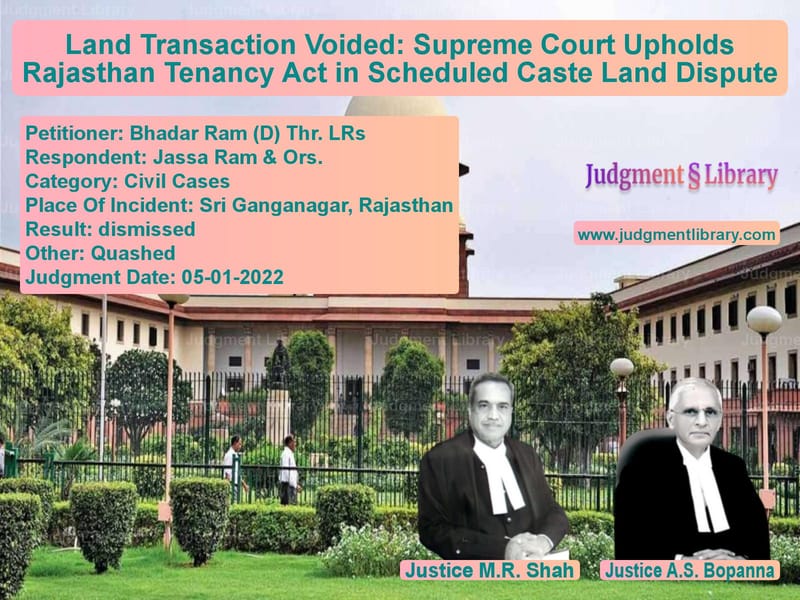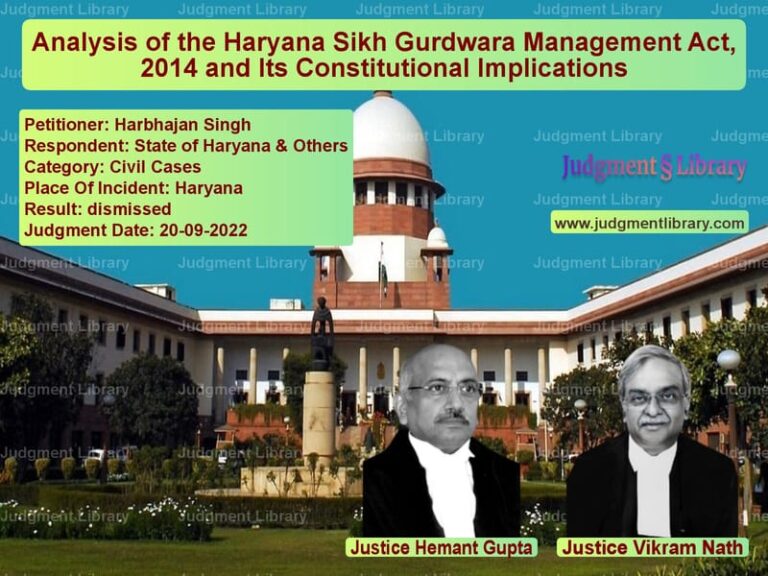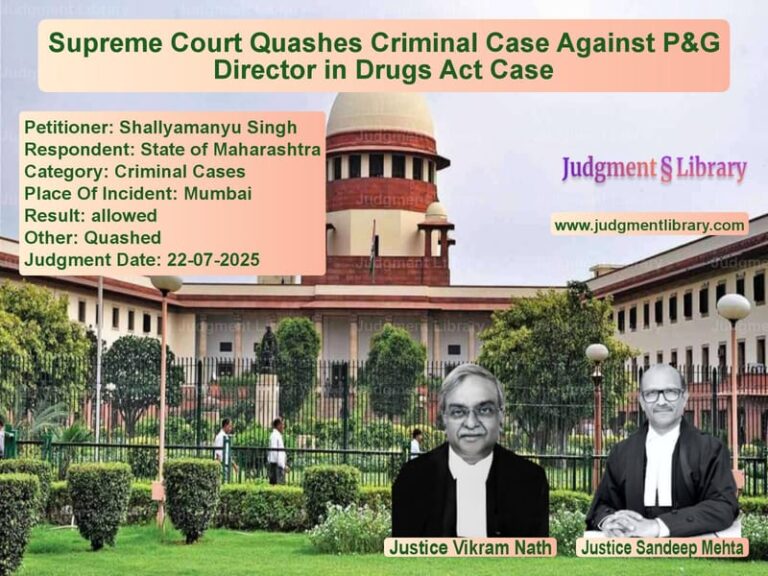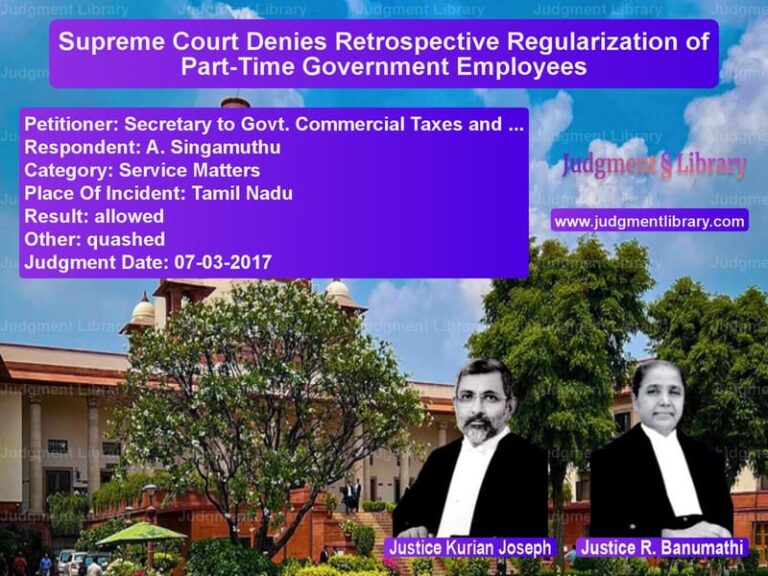Land Transaction Voided: Supreme Court Upholds Rajasthan Tenancy Act in Scheduled Caste Land Dispute
The case of Bhadar Ram (D) Thr. LRs vs. Jassa Ram & Ors. revolves around a land dispute concerning a transaction that violated the provisions of the Rajasthan Tenancy Act, 1955, and the Rajasthan Colonization Act, 1954. The Supreme Court examined whether a person belonging to a Scheduled Caste in Punjab could claim the benefit of Scheduled Caste status in Rajasthan to purchase agricultural land allotted to a Scheduled Caste landless person. The Court ruled that such a transaction was invalid and upheld the Division Bench’s decision to void the sale.
Background of the Case
The dispute pertains to agricultural land situated in village Dharamsinghwala, Tehsil Sadulshahar, District Sri Ganganagar, Rajasthan. The land was originally allotted to Chunilal, a Scheduled Caste landless person and father of the respondent, Jassa Ram.
According to the respondent, in 1972, Chunilal borrowed ₹5000 from Puran Singh (a high-caste Jat). Under the pretense of documentation, Puran Singh fraudulently executed a sale deed in favor of Bhadar Ram, a resident of Punjab, to circumvent the restrictions imposed by Section 42 of the Rajasthan Tenancy Act.
Chunilal filed a suit for ejectment against Puran Singh and Bhadar Ram, arguing that the transaction was illegal and violated statutory provisions meant to protect Scheduled Caste landowners.
Petitioner’s Arguments
The appellant, represented by Gopal Singh, argued:
- The original plaintiff admitted that the appellant was a Scheduled Caste member, and there was no formal issue framed on his caste status in relation to Rajasthan.
- The Board of Revenue had already regularized the transaction under Section 13A of the Rajasthan Colonization Act.
- His grandfather and father had purchased lands in Rajasthan, making him a resident of Rajasthan.
- The transaction could not be voided merely because he was a resident of Punjab at the time of the sale.
Respondent’s Arguments
The respondent, represented by Ms. Christi Jain, countered:
- The appellant was a resident of Punjab and not Rajasthan, as reflected in revenue records.
- The land in question was purchased in a benami transaction for Puran Singh, who was not a Scheduled Caste member.
- Under Section 42 of the Rajasthan Tenancy Act, the sale was illegal because it was executed in favor of someone who was not a Scheduled Caste resident of Rajasthan.
- The compounding of the transaction by the Board of Revenue was invalid because possession had already been handed over to the respondent.
Key Observations of the Supreme Court
A bench comprising Justice M.R. Shah and Justice A.S. Bopanna made the following observations:
- The appellant’s address in all records was in Punjab, not Rajasthan.
- Being a Scheduled Caste in Punjab did not automatically qualify him for Scheduled Caste benefits in Rajasthan.
- The land was originally allotted to a Scheduled Caste landless person and was protected under Rajasthan tenancy laws.
- The transaction violated Section 42 of the Rajasthan Tenancy Act and was therefore void.
- The Board of Revenue’s order permitting compounding was invalid as possession had already been handed over to the plaintiff.
Final Judgment
The Supreme Court ruled:
- The Division Bench’s decision was upheld, declaring the sale void.
- The transaction was in violation of Section 42 of the Rajasthan Tenancy Act, 1955, and Section 13 of the Rajasthan Colonization Act, 1954.
- The Board of Revenue’s decision to allow compounding was reversed.
- The appeal was dismissed, and the land was restored to the original allottee’s successor.
Implications of the Judgment
The ruling has significant legal implications:
- Enforcement of Land Protection Laws: The judgment reinforces restrictions on the sale of land allotted to Scheduled Caste individuals.
- Scheduled Caste Benefits Are State-Specific: The ruling clarifies that Scheduled Caste status is determined based on the state of residence.
- Benami Transactions in Land Deals: The decision discourages fraudulent transactions where non-eligible individuals use intermediaries to bypass land protection laws.
- Judicial Oversight of Revenue Authorities: The case underscores that revenue authorities cannot override statutory land protections.
Conclusion
The case of Bhadar Ram vs. Jassa Ram highlights the Supreme Court’s strict approach to protecting Scheduled Caste landowners from fraudulent transactions. The ruling ensures that the sale of land granted under government schemes remains protected and that caste benefits cannot be transferred across state lines for such transactions.
Petitioner Name: Bhadar Ram (D) Thr. LRs.Respondent Name: Jassa Ram & Ors..Judgment By: Justice M.R. Shah, Justice A.S. Bopanna.Place Of Incident: Sri Ganganagar, Rajasthan.Judgment Date: 05-01-2022.
Don’t miss out on the full details! Download the complete judgment in PDF format below and gain valuable insights instantly!
Download Judgment: bhadar-ram-(d)-thr.-vs-jassa-ram-&-ors.-supreme-court-of-india-judgment-dated-05-01-2022.pdf
Directly Download Judgment: Directly download this Judgment
See all petitions in Property Disputes
See all petitions in Landlord-Tenant Disputes
See all petitions in Judgment by Mukeshkumar Rasikbhai Shah
See all petitions in Judgment by A. S. Bopanna
See all petitions in dismissed
See all petitions in Quashed
See all petitions in supreme court of India judgments January 2022
See all petitions in 2022 judgments
See all posts in Civil Cases Category
See all allowed petitions in Civil Cases Category
See all Dismissed petitions in Civil Cases Category
See all partially allowed petitions in Civil Cases Category







